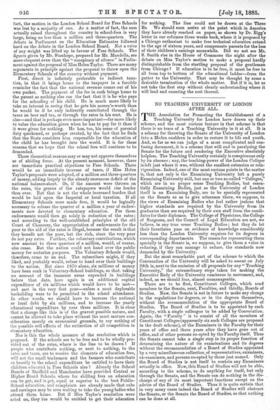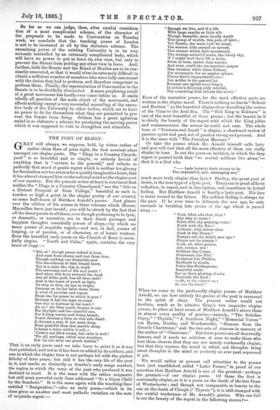NO TEACHING UNIVERSITY OF LONDON AFTER ALL.
THE Association for Promoting the Establishment of a Teaching University for London have drawn up their scheme, and the most curious feature in that scheme is that there is no trace of a Teaching University in it at all. It is
a scheme for throwing the Senate of the University of London into a Medea cauldron in order to restore it to life and youth. And, so far as we can judge of a most complicated and con- fusing document, it is a scheme that will end in paralysing the Senate for the future and rendering the Executive absolutely helpless. The Teaching University certainly is conspicuous only by its absence ; nay, the teaching-power of the London Colleges is left just where it was, without the smallest extension or rein- vigoration. Indeed, one of the most curious points in the matter is, that not only is the Examining University left a purely Examining University still, but one or two so-called "Colleges," which are in no proper sense Teaching Bodies, but essen- tially Examining Bodies, just as the University of London itself is an Examining Body, are to be specially represented on the Senate so as to give utterance there, we suppose, to the views of Examining Bodies who feel rather jealous that higher standards are required by the University from its graduates than are required by their own staff from the candi- dates for their diplomas. The College of Physicians, the College of Surgeons, and the Council of Legal Education are not, we believe, in any true sense Teaching Bodies ; but they do let their licentiates pass on evidence of knowledge considerably less than the London University requires for its degrees in corresponding departments. The reason for representing them specially in the Senate is, we suppose, to give them a voice in reducing, if they can manage to reduce, the standards now demanded by the University.
But the most remarkable part of the scheme to which the Convocation of the University will be asked to assent on July 28th is, next to the omission of all proposals for any" Teaching University," the extraordinary steps taken for making the Executive Body of the University cumbrous in movement, and, indeed, as we should fear, almost unmanageable.
There are to be first, Constituent Colleges, which send members to the Senate, next, Faculties, and thirdly, Boards of Studies. Now, the Senate is not in future to make any change in the regulations for degrees, or in the degrees themselves, without the recommendation of the appropriate Board of Studies. The Board of Studies is to be appointed by each Faculty, with a single colleague to be added by Convocation. Again, the "Faculty" is to consist of all the members of Constituent Colleges (apparently six such Colleges are proposed in the draft scheme), of the Examiners in the Faculty for their years of office and three years after they have gone out of office, and of other persons co-opted by the Faculty itself. Thus the Senate cannot take a single step in its proper function of determining the nature of its examinations and its degrees without the recommendation of a Board of Studies appointed by a very miscellaneous collection.of representatives, examiners, ex-examiners, and persons co-opted by those just named. Only the Board of Studies is not itself to contain any Examiners actually in office. Now, this Board of Studies will not be able, according to the scheme, to do anything for itself, but only through the Senate, and the Senate can do nothing in the dis- _ charge of any of its most important functions except on the advice of the Board of Studies. Thus it is quite certain that in very many cases indeed the Board of Studies will obstruct the Senate, or the Senate the Board of Studies, so that nothing can be done at all.
So far as we can judge, then, after careful considera- tion of a most complicated scheme, of the character of the proposals to be made to Convocation on Tuesday week, we conclude that the teaching power of London is not to be increased at all by this elaborate scheme. The examining power of the existing University is to be very seriously controlled by an extremely complicated body, which will have no power to put in force its own view, but only to prevent the Senate from putting any other view in force. And, further, both the Senate and the Board of Studies are to be con- stantly renovated, so that it would often be extremely difficult to obtain a sufficient number of members who were fully conversant with the duties they had to perform, and therefore competent to perform them. Finally, the representation of Convocation in the Senate is to be decidedly diminished. A more perplexing result of a great movement has hardly ever come before us. It omits wholly all mention of the main object of the movement, and effects nothing except a very successful manacling of the execu- tive body of the University by other bodies, which are to have no power to do for themselves what they are permitted to pre- vent the Senate from doing. Seldom has a great agitation ended in so elaborate a scheme for paralysing the moving power which it was supposed to wish to strengthen and stimulate.



































 Previous page
Previous page